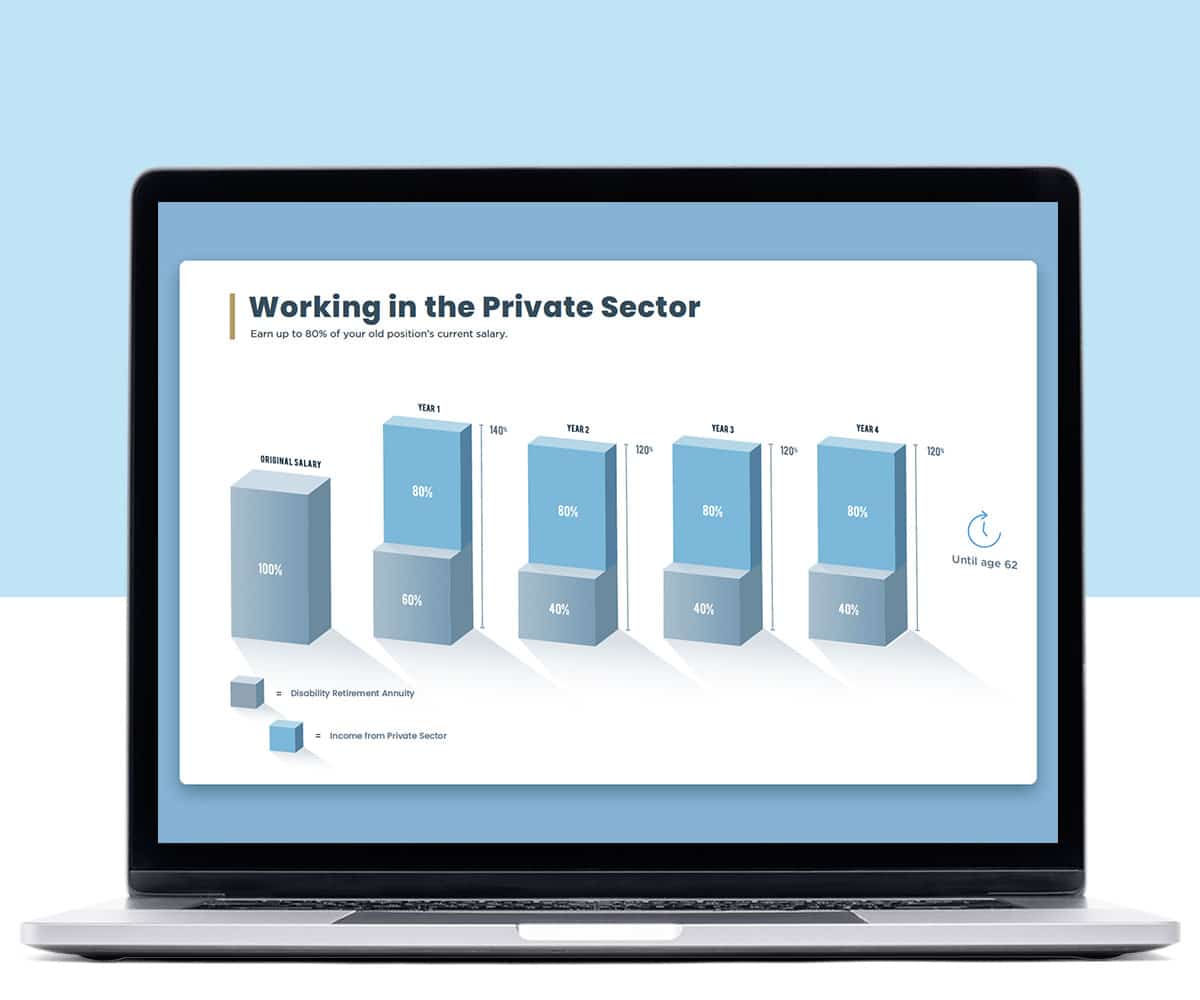Retirement can be stressful because there are so many decisions to consider. Many imagine lounging on the beach reading a good book. But this is just a fantasy if you do not properly plan for your retirement. Many federal employees don’t think about retirement until it’s too late. This could postpone your retirement, or you could end up without enough money to sustain you or your family.
Luckily, there are a lot of things you can do to financially prepare for retirement. In this article, we will discuss some of the best ways to financially prepare for your federal retirement!
Thrift Savings Plan
Your federal retirement consists of three main parts; your retirement pension, social security benefits, and your Thrift Savings Plan. Your Thrift Savings Plan (TSP) is one of the greatest benefits to becoming a federal employee, and if you are not taking advantage of your TSP, you are going to miss out on a lot of compensation in retirement.
Your TSP is an investment plan– you are able to add money from each paycheck and your agency will contribute based on how much you add. Your federal agency will match your TSP contributions up to 5% of your base pay. If you are not making contributions, you are missing out on the agency match, and you’re losing free money to help financially prepare.
You should start contributing to your TSP as soon as possible and contribute as much as possible. This will provide you with the most security in retirement. You can change your contributions over time to match your income fluctuations.
Retirement Pension
The Federal Employees Retirement System is considered one of the best retirement packages available, but the federal retirement pension alone provides a substantial retirement income. It’s important to know how much you will receive from your federal retirement pension in order to properly plan for your future.
Your regular FERS retirement will be calculated based off your high-3 average and your creditable years of service. Your high-3 average is your 36 consecutive months of the most pay and is calculated by the OPM.
If you have less than 20 years of service at retirement, you will receive 1% of your high-3 average for each year of service.
If you have more than 20 years of service at retirement, you will receive 1.1% of your high-3 average for each year of service.
If you are a special provisions employee, your retirement will be calculated at a higher rate. Learn more about special provisions.
You can request an annuity estimate from your HR office for an idea of what to expect to help you financially prepare for retirement.
Social Security
In addition to your TSP and retirement pension, you will also receive social security benefits in retirement. The amount of your social security benefit is based on how much you have paid into the system and how long you have worked. But you should know that there are a lot of factors that go into determining how much you can receive.
Working until your full retirement age, working after retirement, and delaying claiming your social security benefits can all increase the amount you receive. To get an estimate of your benefit, you can contact your local SSA office or visit the website here.
Health and Life Insurance
Healthcare expenses are often some of the costliest expenditures in retirement, especially for those living with a disability, but you still have options in retirement.
You will be able to carry your FEHB health insurance into retirement if you have been enrolled for at least five years or during all of your federal employment, if less than five years. You can carry FEGLI into retirement under these same terms, but you must carry those options for at least five years to keep them through retirement.
This can make a huge difference to your financial security in retirement as healthcare costs continue to rise.
It’s important to note that you can change your insurance elections during open season. You do not have to stay on FEHB or FEGLI during retirement if you find better options available to you.
Survivor Annuity
If you are married, you have the option to provide a survivor annuity for your spouse in retirement. A survivor annuity is an insurance policy that will pay your spouse a certain percentage of your retirement income in the event of your passing.
When filling out your retirement forms, you will have to choose one of three survivor annuity options–
- Maximum Survivor Annuity- this would provide your spouse with 50% of your unreduced annual benefit, and the ability to continue your insurance elections
- Partial Survivor Annuity- this would provide your spouse with 25% of your unreduced annual benefit, and the ability to continue your insurance elections
- No Survivor Annuity- this would not provide your spouse with any benefit, and they would not be able to continue your insurance elections
Your spouses need for medical coverage should be taken into consideration when choosing a survivor annuity as they will be able to continue your insurance benefits if maximum or partial survivor annuities are chosen.
Military Buyback
If you are a federal employee with prior military service, you have the option to buyback your military time to receive retirement credit for that service.
Buying back those years will add creditable years of service to your retirement, increasing your retirement pension. Additional years could potentially bring you closer to your retirement as well.
You will have to buy back those years in full prior to retirement for them to count, but you do have the option to make payments on the buyback over time. You can contact your HR office to start this process.
Save, Save, Save!
Anyone planning to retire likely wants to save anything and everything they can in interest bearing accounts. Why? One word, inflation. Saving money is great, but when you save money in cash or basic savings accounts this money will lose buying power at the rate of inflation. So, knowing how to save properly is extremely important to financially prepare for retirement. Retiring may seem like a distant dream but it’s never too early to start planning and saving up.
Talk to a Professional
Keep in mind there are other investment options besides the TSP that could provide a significant return. They can help you make a plan, find private sector products, and determine how to maximize your income (like when is the best time to take social security). Additionally, there are some private sector investment options that are only available to federal employees.
Speaking with a financial advisor experienced with federal employee benefits can have a huge impact on your retirement.
Planning for retirement can be overwhelming, but we are here to help.
If you are a federal employee struggling with a disability and are worried about reaching retirement, schedule a FREE consultation today to learn about all your options.



